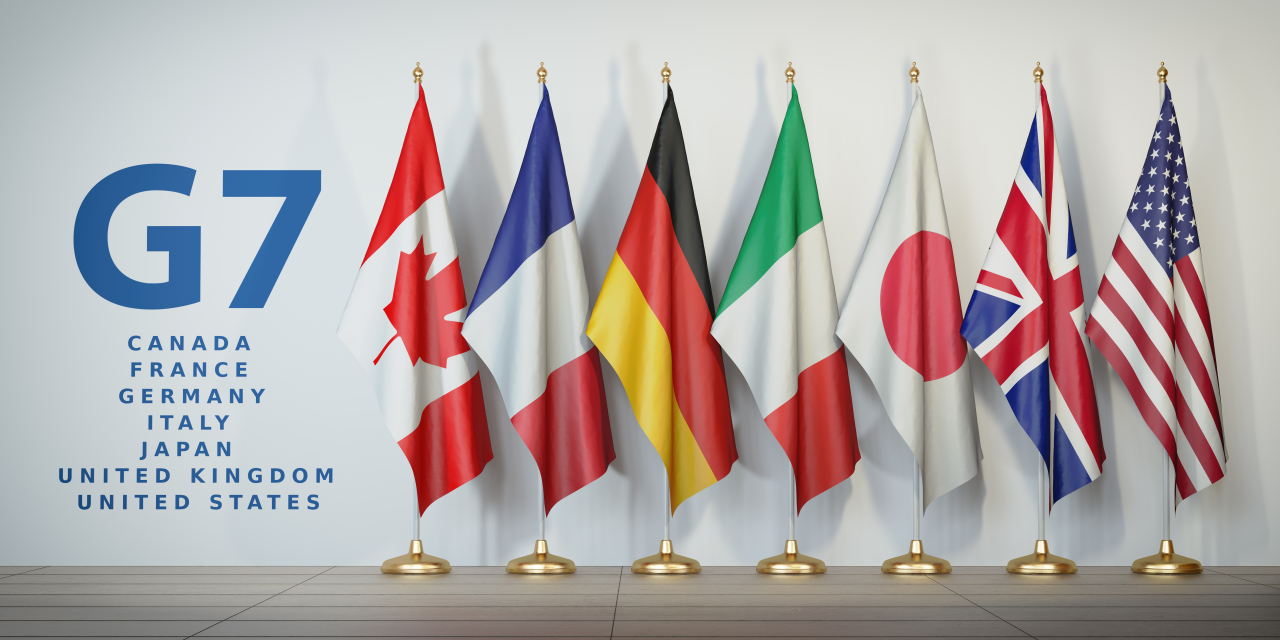US President Donald Trump’s surprise invitation Saturday to South Korea to the expanded Group of 7 summit in September, along with three other countries, hints at Korea’s elevated status, and is also a double-edged sword amid the deepening rivalry between the US and China, experts here said Sunday.
They called on Seoul to draw up a strategy so as not to risk upsetting its security alliance with Washington or economic ties to Beijing, because the summit could shift to a US-led, anti-China coalition.
Calling G-7 a “very outdated group,” Trump told reporters on Air Force One: “I’m postponing it because I don’t feel that as a G-7 it properly represents what’s going on in the world.”
Korea, Australia, India and Russia would be invited to attend the summit put off to September from late June, he added. Since 1976, leaders from the US, Britain, Germany, France, Italy, Canada and Japan have annually held the meeting to discuss global economic challenges.
“The government will consult with the US on the matter,” an official at Cheong Wa Dae said, noting it had not been informed of the Washington’s decision in advance.
With only a month left before the summit was scheduled to open, the dramatic pivot Trump announced may embody his determination to reduce Chinese influence, and Korea should be prepared to make its interests heard at the expanded summit, several experts contacted by The Korea Herald said.
“The summit will go ahead whether we say yes or no, so the issue here is what we can do about it in light of our long-standing alliance with Washington and close trading ties to Beijing,” said Choi Kang, vice president of the Asan Institute for Policy Studies, in a phone interview.
“I’m more inclined to suggest we go there and be part of the new brigade to offset China's growing influence, a pressing concern for Korea now” Choi said, adding the countries at summit would be unlikely to wage an irredeemable confrontation against China, as Trump might be hoping.
The relations between the two Asian neighbors look shaky again as Beijing had earlier raised a protest against Seoul over its replacement of American-made anti-missile batteries that Beijing claims to aim at its mainland.
China had reacted with economic retaliation against Korea, when it installed the anti-missile systems three years ago.
Choi said it was important that Seoul remains in close consultation with the new emerging group of major powers to have the global initiatives agreed upon there to reflect its best interests.
“It’s clearly an anti-China coalition. Trump is inviting even Russia, which has always wanted a seat at the summit, to drive a wedge between Moscow and Beijing,” said Shin Beom-chul, director of Center for Diplomacy and Security at Korea Research Institute for National Strategy.
The Washington’s invitation is seen as evidence of elevated status of Seoul, which has received praise for its successful response to the ongoing coronavirus pandemic.
“The G-20 summit became a stronger coalition after the global financial crisis in 2008. Likewise, the expanded summit, prompted in part by the global health crisis, could be the new forum that convenes periodically,” said the think tank’s Vice President Choi.
But some experts were wary of the conclusion, pointing to the packed US calendar and Trump’s peculiar governance style.
“Would the expanded summit be the new norm? It’s hard to say for now, because Trump will have to win his reelection bid to make his policy durable,” Shin said.
Leif-Eric Easley, who teaches international studies at Ewha Womans University in Seoul, said: “We should probably treat as tentative any diplomatic effort President Trump announces by tweet or in unprepared remarks.”
Other experts said the new coalition Trump floated could be linked to Washington’s long term commitments to realigning global supply chains to suppress Beijing that has demonstrated a meteoric economic ascent.
“Korea and India, manufacturing powerhouses, are invited to the summit,” Hwang Ji-hwan, an international relations professor at the University of Seoul, told The Korea Herald.
“The G-7 is a group of leaders in the global financial sector. They need someone from the manufacturing sector to more effectively counter China,” Hwang added, saying Seoul and New Delhi’s turn to an anti-China drive would upset Beijing, another manufacturing giant in rush to stretch its economic clout.
By Choi Si-young (
siyoungchoi@heraldcorp.com)





![[Herald Interview] 'Trump will use tariffs as first line of defense for American manufacturing'](http://res.heraldm.com/phpwas/restmb_idxmake.php?idx=644&simg=/content/image/2024/11/26/20241126050017_0.jpg)


![[Herald Review] 'Gangnam B-Side' combines social realism with masterful suspense, performance](http://res.heraldm.com/phpwas/restmb_idxmake.php?idx=644&simg=/content/image/2024/11/25/20241125050072_0.jpg)